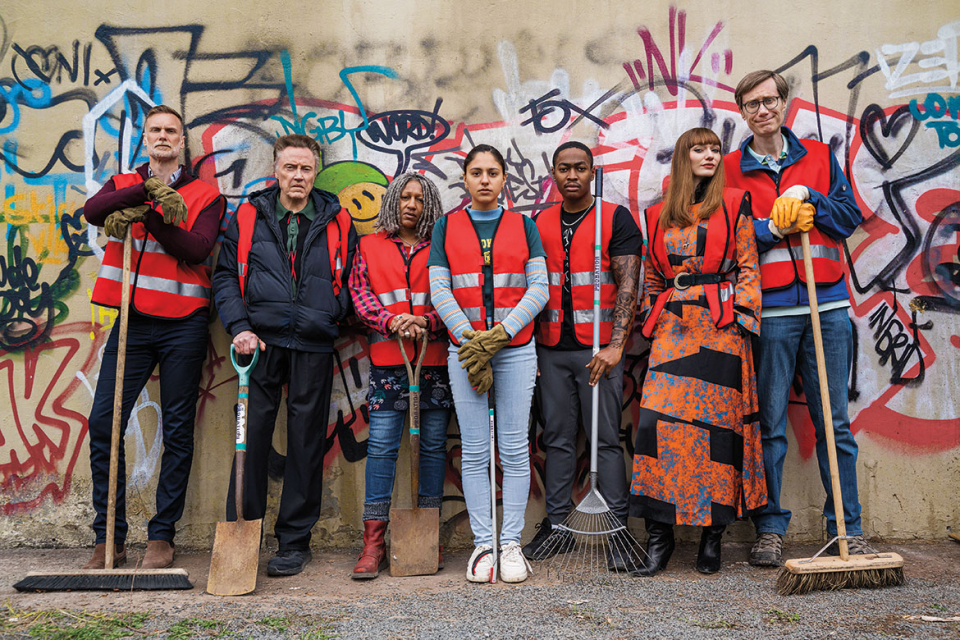Stephen Merchant has always seen the world from a different angle. Maybe it's because he stands six foot seven, with a goofy smile and a disarming British West Country accent that makes him sound like a farmer. Or maybe it stems from his upbringing.
He grew up in Bristol, England, where his film-loving dad encouraged a diet of Brit comedy classics like Fawlty Towers and Monty Python, as well as American comedy — M*A*S*H, Roseanne and Richard Pryor — and Golden Age Hollywood. Billy Wilder is a particular favorite. "Someone like that became very alluring to me," he says, "because he didn't seem to have any rules about what genre he played."
Merchant's own work has always been crossgenre, footloose and offbeat. From The Office, which he cocreated with Ricky Gervais in 2001 (thus sparking a wave of television mockumentaries), to HBO's Hello Ladies, an ironically titled exercise in withering self-deprecation, Merchant throws things together that shouldn't work and yet somehow do.
In his feature directorial debut, Fighting with My Family, he fashioned an underdog story out of professional wrestling in Britain — a country that doesn't have any pro wrestling. And now in The Outlaws, his new series streaming on Prime Video, he's throwing the unlikeliest things and characters together again.
"My parents used to work for Bristol community service," he says, speaking from Bristol, where The Outlaws shot two seasons back-to-back last year. "In my later teens, my mother would — not naming names, being very careful — talk about some of the people that came through the doors."
What intrigued Merchant was the mix of characters that community service threw together. "You'd have the businessman who'd got caught drunk driving and a foreign student who got in trouble for some minor thing," he says. "Or an old guy that they realized was stealing cabbages just to get community service because he was lonely and liked the social aspect of it. A few people I went to school with even came through my mother's doors."
Years later, once Merchant had graduated to TV comedy through stints on radio (where he met Gervais), he realized that these stories from his parents' work were a gold mine for television drama. And community service provided the perfect setting.
"You could have a completely random cross-section of society and it was totally legitimate that they were there together, doing community service. I was always interested in the idea of that — finding ways of bringing people together is a great objective for a TV show. And I liked doing something that had a kind of crime undertow, or a crime thriller-y aspect, but that didn't just involve policemen or private detectives."
It was the second part that presented a problem. Though Merchant knew a lot about community service, he knew very little about the criminal underworld. "Surprising though it may seem," he says, smiling politely in a baseball cap and glasses, "I've had very little gang involvement."
But as always, Merchant wanted his show to contain multitudes, to offer different perspectives. At the time, he was based in Los Angeles, so he spoke to his agent there.
"I asked, 'Is there someone who's sort of the polar opposite of me, perhaps someone who's had involvement with gangs or is involved with crime, anyone who's got some sort of history, that's a bit more substantial?' And they just said, 'Yeah. You should meet this guy Elgin.'"
That was Elgin James, showrunner and cocreator of the FX series Mayans M.C. A tattooed and muscular former gang member, he's everything that Stephen Merchant isn't.
"I'd seen Hello Ladies, so I was already a huge fan of Steve," James says. "Hello Ladies is the best, the most honest and truthful depiction of Los Angeles I've ever seen. And we just hit it off. We met for lunch and the chemistry was off the charts — even though we look like a comedy skit, because he's so tall and white and I'm like short and brown. We found ourselves talking about Singin' in the Rain, but also about Lilja 4-ever [the 2002 Russian-language Swedish-Danish film]. We could go from Gene Kelly to [Lilja director] Lukas Moodysson."
At first Merchant and James imagined The Outlaws as a feature film, but they soon found that with their personalities and approaches — plus a shared love of ensemble drama and a raft of influences — only a TV series could encompass their vision. They went on to craft a typically atypical Merchant production.
The Outlaws imagines a community outreach program in Bristol featuring a hodge-podge chain gang tasked with fixing up a dilapidated community center. It throws together seven unlikely teammates, from a straight-A student (Rhianne Barreto) who shoplifts for thrills to a young man (Gamba Cole) who's in debt to the wrong people. There's a thriller plot involving drug gangs — part of James's contribution — which means the whole thing is shot through with some very real peril.
Add Christopher Walken as Frank — an inveterate American huckster who married a Brit way back when and never left — and Merchant and James have assembled quite the menagerie.
Merchant notes that the Frank character was planned before Walken's name came up.
"On the surface it might look like stunt casting," he says, "but that character was always American. Even before Amazon came on board, we wanted someone who feels alien in that world, who has a bit of The Man Who Fell to Earth about him," referring to Nicolas Roeg's alien-out-of-water movie. But Walken's presence — he even dances at one point — does feel like a coup. In fact, this marks his first role as a television series regular.
"I'm an actor, it was a good job," Walken says with a laugh from the Bristol set. "And I'm a fan of Stephen Merchant's. We met in my house [in Connecticut]. And I was very taken with him. It's very good writing, you can tell that, you know, if you've been doing it for as long as I have. I stand in my kitchen and I read the lines out loud. And these were very good words."
Still, it takes several episodes of The Outlaws to get used to the sight of Christopher Walken in a high-visibility vest sweeping up rubble like he's wandered onto the wrong set. And even then, his character never does the things Christopher Walken characters tend to do.
This, according to Merchant, was always the point.
"When I first had the idea quite a few years ago, Brexit was on the horizon and Trump was brewing. It felt like we were living in a very divided time. What interested us was the idea that if I was to meet someone like Elgin in passing, what would my preconceptions be in looking at him and hearing that he'd been in gangs, or hearing that he'd been in jail? My preconceptions as a sort of middle-class white bloke could potentially be one thing... and they would be completely wrong."
Merchant calls it preconceptions. James calls it prejudice.
"We talked, again, in that very first meeting, about how to get past these clichés: how we look at people, because we're trying to always simplify," James says. "Prejudice in general is how we survive through the day, right? We put this person in this box, that person's in that box. Let me stay here in my box. And that's what's beautiful about art — you can break those boxes open."
But throwing together such a disparate cast of convicted criminals, one step shy of prison, wasn't simple. Problem one: was it supposed to be funny, serious, or both?
"It is a tricky balance to get right," Merchant admits. "I was always trying to compare it to funny episodes of dramas, so a great touchstone for me was the episode of The Sopranos called 'Pine Barrens.' It's the famous one where Paulie and Christopher get lost in the snow, and they're trying to bump off a sort of Russian mobster... and Paulie doesn't have shoes.
"It's very funny and very darkly comic, and yet the stakes are huge. They never break the drama rules of the show, but it has a great sense of humor. You find that in a lot of good drama. Particularly American stuff, which can walk that fine line."
Season one of The Outlaws has already aired in the U.K., where it was the BBC's biggest new comedy. Merchant — who cowrote, directed four episodes and plays a feckless lawyer — says he was lucky to have the backing of both Amazon Studios and BBC Studios (which produced along with Big Talk Productions and Merchant's Four Eyes Entertainment).
With that support, he was able to court actors of Walken's caliber. Plus, "There were no mandates or instructions about what could be explored." It meant Merchant could try to walk that "Pine Barrens" tragicomic fine line. And he could stick to his original plan: he insisted that The Outlaws be set in Bristol, even though he recognizes that suburban Bristol is not a place most viewers will know.
"This is going to seem slightly fanciful," he says, "but I used this comparison, and then coincidentally, a number of other people have said it to me, independently. I think there are some comparisons between Bristol and San Francisco." He laughs, because the San Francisco of screen culture seems worlds away from Bristol.
"I don't mean that Bristol has the grandeur and the glamour of San Francisco or California," Merchant adds, "but it's on the water, it has a very striking bridge [the Clifton suspension bridge] and it has hills and heights and lows, which we know San Francisco has. It has a bohemian, artsy side, alongside money and history. So it seemed like an interesting comparison."
More important, Merchant says, is that in this era of global television, cultural specificity — of people and place — has become key to successful fiction. "What's always important to me — and we realized this with the success of The Office — is that the more specific you are, the more universal [the story] becomes. If you're trying to be too general and you live in this kind of no man's land, people find it harder to tune in."
And there are always parallels to be found between one place and another, James adds, between the mentalities they breed and the sensibilities they foster. It's up to good writers to point them out.
"I'd never been to Bristol," he says. "But Steve's stories about Bristol and the love he has for it — it's similar to being from Boston or Philadelphia or other cities in the States: when you're there, all you want to do is get the hell out. It suffocates you. But then you have such a love for it when you're gone."
And as Merchant proves, that love can reveal itself in the unlikeliest ways, like asking Christopher Walken to get busy with a broom.
In addition to Merchant, the executive producers for The Outlaws are Luke Alkin, Kenton Allen and Matthew Justice.
This article originally appeared in emmy magazine issue #2, 2022, under the title, "Home, Sweep Home."
All six episodes of The Outlaws premieres on Friday, April 1 on Prime Video



